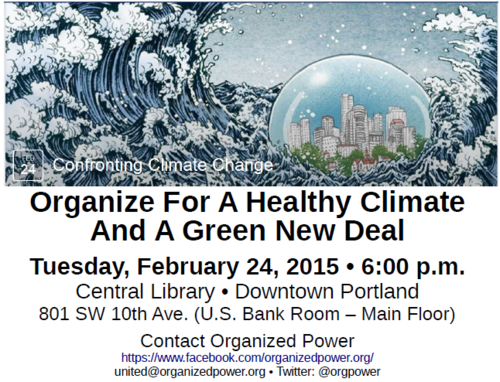Confronting Climate Change - Tuesday February 24 2015
Confronting Climate Change - Tuesday February 24 2015
[improve]

{{#TwitterFBLike:right|small|like}}
- Date: Tuesday, February 24, 2015
- Time: 6:00 - 7:45 p.m.
- Location: Multnomah County Central Library - U.S. Bank Room - (Main Floor) - 801 SW 10th Ave. (Downtown Portland)
- Jump to this event's wiki page, edit it, discuss it or return to the events page.
Purpose
Presented by Organized Power.
Coming Together As A Single Voice To Confront Climate Change
At the end of last summer, hundreds of thousands of people all over the world participated in an “invitation to change everything”—the “People’s Climate March.” A United Nations’ Climate Change Newsroom reported that more than six hundred thousand people marched in more than twenty-five hundred demonstrations in over one hundred and sixty-six countries.[1] Other estimates were even higher.[2]
The march that took place in New York City now stands as the “largest climate march in history.”[3] Marchers took to the streets to demand a “world we know (that) is within our reach: a world with an economy that works for people and the planet; a world safe from the ravages of climate change; a world with good jobs, clean air and water, and healthy communities.”
We couldn’t agree more! Yet the marchers have all gone home. City streets have returned to their usual daily hustle and bustle. Business continues as usual. And human activity continues to rapidly degrade the one planet on which all of Earth’s living beings depend. Where do we go from here?
Catastrophic But Not Serious
Cultural critic Slavoj Žižek is fond of telling a tale about a supposed exchange of telegrams between German and Austrian army headquarters in the middle of the First World War. As Žižek tells it, the Germans sent the message “Here, on our part of the front, the situation is serious, but not catastrophic,” to which the Austrians replied “Here, the situation is catastrophic, but not serious.”[4]
So far, our response to the unfolding catastrophe of climate destabilization is similarly absurd. The situation is catastrophic, but our collective response seems less than serious. Some have argued for radical intervention. In a landmark essay, David Holmgren—one of the world’s foremost permaculture practitioners—calls for massive disengagement from consumerism.[5] Holmgren’s basic argument is that the planet-destroying system currently dominating global economics could crash if just ten percent of the world’s middle-class consumers radically cut their consumption. Such a unified effort, he argues, might be just enough to avoid “driving over the climate cliff.”
Organizing A Green New Deal: Ten Million Climate Jobs to Help Solve The Economic And Environmental Crises
Undoubtedly, we must do everything we can to avoid driving over Holmgren’s “climate cliff.” But even as we try and avoid climate catastrophe, we’re still required to take care of ourselves and our families, and contribute productively to our communities.
Mindful of our personal responsibilities, this is also the time to more vigorously and urgently respond to the perils of ongoing climate destabilization and ecological collapse. The stakes are so high that this is our time to make big demands, and enforce them through persistent organizing and movement building.
We believe our goal should be nothing short of transforming the destructive nature of our current economic order into one that will provide working people with meaningful employment, and allow us to live at peace with our natural surroundings. We propose one big demand—A Green New Deal: Ten Million Climate Jobs to Help Solve The Economic And Environmental Crises.
In order to bring this vision into concrete reality, we must build a movement—unified as a single voice—which includes the biggest and most diverse mobilization of ordinary people imaginable. It’s a massive challenge. You are invited to help shape how this vision transforms from idea to reality.
RSVP: Confronting Climate Change (Facebook event and invite page.)
Other details
Free
more information
References
- ↑ 600,000 People March for Climate Action
- ↑ How Many People Really Showed Up To The People’s Climate March?
- ↑ The largest climate march in history
- ↑ Žižek, Slavoj. “Conclusion: The Political Suspension of the Ethical.” Less Than Nothing: Hegel and the Shadow of Dialectical Materialism. London: Verso, 2012. 963-1010. Print.
- ↑ Crash on Demand: Welcome to the Brown Tech Future